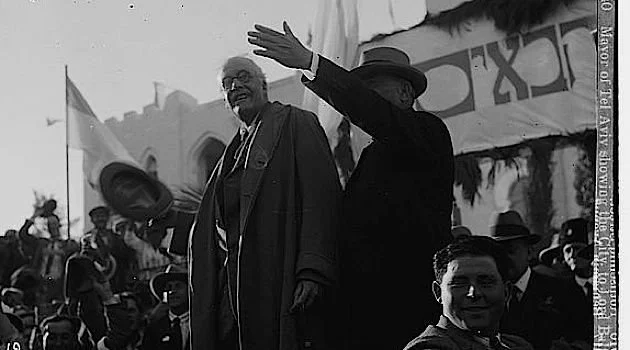Balfour Notes
Alex Ryvchin, The Spectator
For the Jewish people the tiny sliver of land between the Jordan River and the eastern Mediterranean coast has always been their nation’s birthplace and homeland, the fountainhead of the Hebrew language and Jewish civilisation, thought and culture. It is from this land that the Jews were dispersed among the nations and, as enshrined in Israel’s Declaration of Independence, the Jewish people, ‘impelled by this historic and traditional attachment, strove in every successive generation to re-establish themselves in their ancient homeland.’
Despite the weight of their history and its primary place in the Jewish national consciousness, the Jews have never allowed their tragic and tumultuous past to impede the development of their future. Nowhere is this more evident than in the crystallisation of the Jewish yearning to return and self-govern, into a coherent national liberation movement rooted in decolonisation and indigenous rights, which restored the Jews to their ancestral lands and saw the rebirth of a Jewish homeland.
For the Palestinian people, their conception of history has also played a central part in the development of a national consciousness and has determined the trajectory of their own national movement.
The enduring symbol of the Palestinian condition has become the ‘key of return’, evoking the physical keys from properties Palestinians left behind during the failed Arab military invasion that was intended to throttle Israel at birth. The cherished keys recall the yearning of Palestinians also to return, both to the land in a physical sense and in a more potent ideological framing, a return to what they believe was a better time, a time before Israel.
But rather than being a source of strength and purpose from which to build something hopeful and constructive, the Palestinian conception of history has overwhelmingly been a source of bitterness, its manifestations have been frequently destructive, invariably tragic. The resulting wars, terror campaigns and petulant storm-outs from peace summits, have preserved the Palestinian view of history, and sustained the people in a perfect belief in their own victimhood at the cost of achieving a Palestinian State and finally ending the conflict.
Now the Palestinian leadership has taken its people’s national struggle into the realms of the satirical. The Palestinian foreign minister, Riyad al-Malki, announced at an Arab League summit in Mauritania that the Palestinians intend to commence legal action against Britain for proclaiming the Balfour Declaration in November 1917.
Written by foreign secretary Arthur Balfour, the seminal letter declared British support for the establishment of a ‘national home’ for the Jewish people in the territorial region then known as Palestine which was under the dominion of the crumbling Ottoman Empire. 70 per cent of the territory was subsequently cleaved off for the formation of a new Arab emirate of Transjordan (later the Hashemite Kingdom of Jordan) on the east bank of the Jordan River.
The Declaration was given legally binding force in April 1920, following the end of World War I, when a Council of the victorious Allied and Associated Powers met at San Remo and granted Britain a mandate to govern the territory of Palestine on terms which included the pledge to help establish a Jewish national home. Those terms were ratified by the League of Nations in July 1922.
Writing in the Guardian, Ian Black called the latest stunt by the Palestinians ‘a stretch’ that ‘attracted more ridicule than serious analysis’. But the tenacity of the Palestinians in pursuing their objectives in international forums must not be underestimated, no matter how inconsequential or misguided these attempts ultimately prove to be.
In foreshadowing the law suit, the Palestinian foreign minister railed that the British ‘gave people who don’t belong there something that wasn’t theirs.’
In fact, the Balfour Declaration gave nothing to anyone. It simply expressed British support for the idea that the Jews, a people indigenous to the land, should be able to return there to reconstitute their national home if they so desired following the collapse of Ottoman colonial rule.
It was the League of Nations, the predecessor of the United Nations, and not a solitary British minister, that recognised the ‘historical connection of the Jewish people with Palestine’ and the ‘grounds for reconstituting their national home in that country.’ It further encouraged ‘close settlement by Jews on the land’.
These binding international pronouncements, published decades before the Nazi period, demonstrate that Jewish national rights were recognised long before the Holocaust made the justice of a Jewish homeland, not only self-evident, but urgent. They also make nonsense of the proposition often put by Palestinian advocates that Israel was allowed to be created by the European powers to make others pay for their sins in relation to the destruction of European Jewry.
Boorish and unconscionable as al-Maliki’s statement was, it had an unintended virtue. It laid bare the true, but often disguised, Palestinian position that Israel as the nation state of the Jewish people, has no place in any part of the land. This is the only genuinely insurmountable point of difference between Israelis and Palestinians. The Palestinian leaders have also demonstrated the extraordinary lengths to which they will go to mire their people in a sense of grievance and entitlement instead of preparing them for the compromises necessary to finally achieve their own state.
